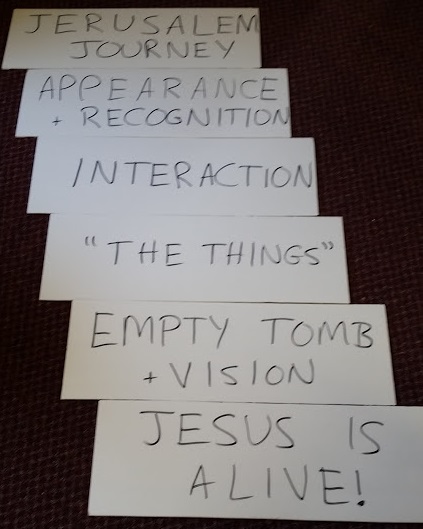Lately, I’ve been asking a lot of questions. Our current sermon series asks a number of questions that have proven to be obstacles to faith for many people. The past couple of website articles (like this one) have posed questions, as well – sometimes introspective, sometimes relating to our world. And I’ve even invited folks at church to ask questions of God and to let me know what those questions are. Thanks to those of you who have taken up that challenge – it’s been quite illuminating for me to hear from you!
With all of these questions, you might start to wonder if and when we’ll find any answers. So today I’d like to take a few moments to describe where I find answers to big questions of faith, and perhaps this can be useful for you, too.
Scripture. As disciples of Christ, our first and most important source of answers is the God-inspired book which introduces us to Christ. Whenever any issue arises, whether it involves relationships at home, management of time and resources, the meaning of life, or anything else, our first course of action is to look to the Bible to glean from its harvest of wisdom. This does not mean, however, that we simply find one or two verses to support the position we already feel is true. On the contrary, we read scripture holistically, from cover to cover, so that we can discover God’s real intention for our lives and his real answers to our questions.
Tradition. In the two thousand years since the New Testament was written – and more since the Old Testament was written – many, many people of faith have lived, died, and struggled with real-life issues in between. We do ourselves a great disservice when we imagine that we’re the first people to struggle with specific questions of faith. Are we struggling to make ends meet and afraid that our resources will soon run out? Let’s see what St. Francis of Assisi believed about material possessions. Are we concerned about the existence of evil in the world? Let’s read recent authors such as C.S. Lewis and Dietrich Bonhoeffer, and let’s read ancient writers like St. Augustine and Thomas Aquinas. We have much to learn from how those who came before us handled the issues we face today.
Reason. The answers to our deepest questions must, in the end, make sense to us. One complaint I’ve heard from people outside the faith is that in order to be a good Christian, you have to “check your brain at the door.” To some extent, I see what they mean: it’s awfully difficult to believe in a God who is one and yet three, to believe that Jesus is fully human and fully divine, to believe that one man’s public execution 2,000 years ago has any bearing whatsoever on our eternal destiny. Yet these and all other issues of faith must be filtered through the brains God gave us. Our questions must find answers that involve our abilities to reason and make sense of the world around us.
Experience. As we search for answers to our deepest questions, we do so as people who have already experienced God’s grace in our lives on many occasions. Are you wondering if God really loves you right now? Think back, if you can, to a moment when you were sure that he did love you. Are you struggling through a difficult situation and unsure how it will be resolved? Think back, if you can, to another difficult period in your life, and remember how God helped to bring you through it. Our experiences can be rich resources for realizing how involved in our lives the Lord truly is. Our experiences can confirm the truths and answers we find in scripture.
May the Lord continue to bless us as we continue to wrestle with questions of faith. Rest assured that there are answers, that God determines those answers, and that he has given us plenty of tools to discover those answers – even though they may take a lifetime to find.
–Pastor David



